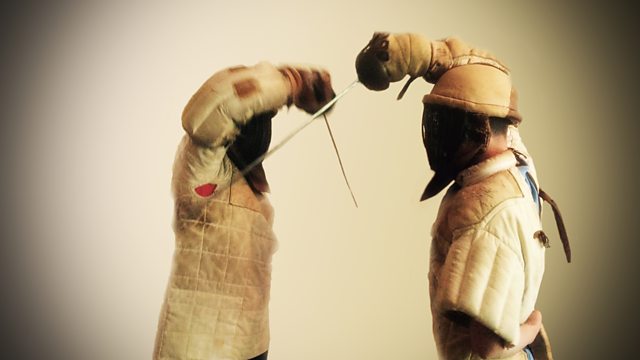Duelling Scars
Horatio Clare meets the German student fraternities whose members duel with razor-sharp swords in a test of courage and honour - and risk being scarred for life.
On a July evening, a group of smartly dressed young men wearing caps and thin tri-coloured sashes are speeding through the south-western suburbs of Berlin. In the boot of the taxi is a set of scalpel-sharp swords. They're heading for a duel. Soon, two of those men will stand face-to-face with their opponents, swords drawn. And somebody may be scarred for life.
Writer Horatio Clare meets the German student fraternities who pursue a 200 year-old tradition of brotherhood, honour and swordsmanship - and for many of whom a duelling scar is still a badge of honour. He meets the members of Corps Marchia Berlin, one of many student Corps across Germany. What sets these all-male fraternities apart is the tradition of Mensur, academic fencing, a duel any aspiring member must undertake several times before they can be full members.
Horatio joins the Corps as two of its members prepare for a Mensur. In the training room at the Corps Marchia house he picks up a Schl盲ger - the Corps duelling sword - and is taught the basic moves for defence and attack. But he discovers for himself that an even more challenging part of the Mensur is the steel goggles that the combatants wear to protect their eyes during a bout. The rest of the head is left exposed but the goggles are fastened so tightly that the swordsman can scarcely see. The duel is fought more by instinct than by sight.
The Corps pride themselves on a tradition of tolerance and neutrality, but many Germans confuse them with other outwardly similar groups who hold right-wing political views. As he trains with the Corps, Horatio asks his hosts about their relevance in the 21st century. They emphasise friendship and brotherhood, along with the courage and discipline which Mensur engenders, but there are other advantages: the lifelong bond between Corps members also gives plenty of networking opportunities after university.
At the Mensur, Horatio discovers that, if one of the duellists is hit, the real test is in how he takes that cut, the Schmiss. He must receive his scar without a flinch, without the slightest change of expression. The honour of the whole fraternity depends on it. This is what it takes to be accepted into their brotherhood. In the Corps, this is what it means to be a man.
Last on
Broadcast
- Mon 26 Oct 2015 11:00大象传媒 Radio 4 FM
Featured in...
![]()
The Archive—Seriously...
Seriously interesting documentaries from Radio 4.
![]()
Top Docs—Seriously...
Start your New Year with a great documentary.




